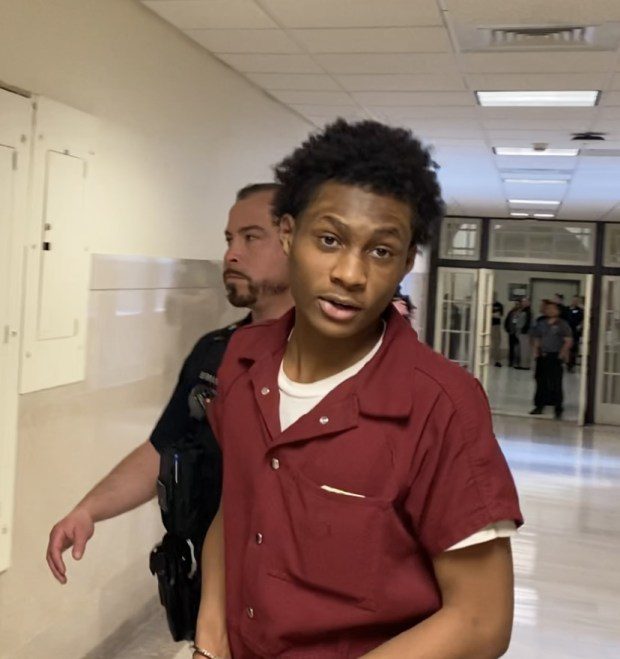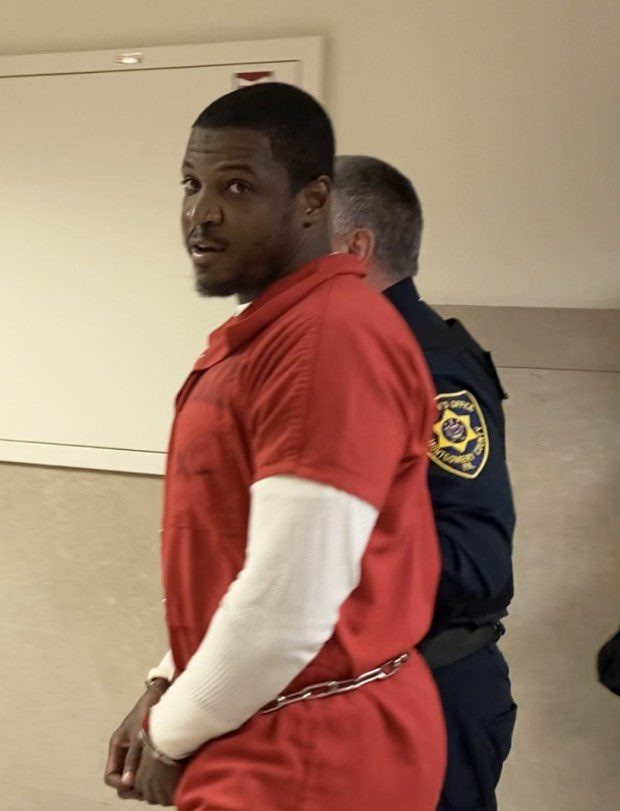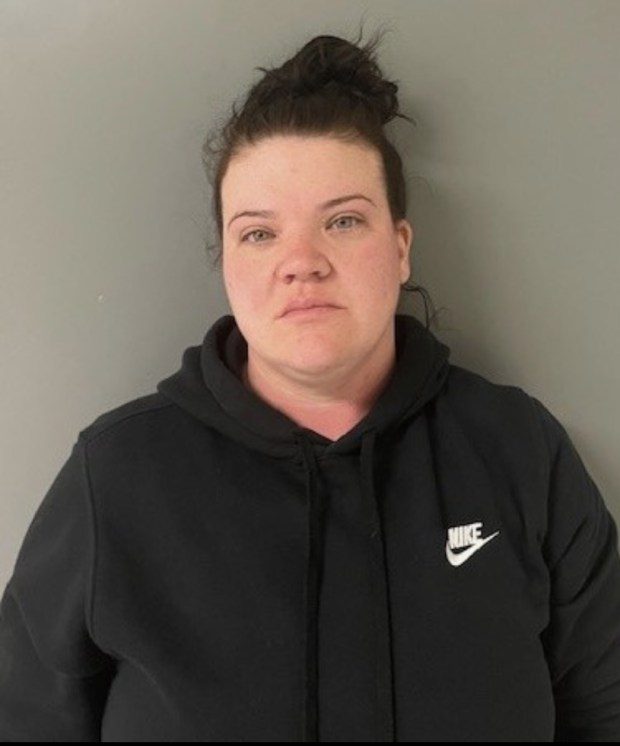A teenager from Norristown, who is facing charges as an adult for his alleged involvement in a robbery that resulted in a fatal shooting, wants to have his case moved to juvenile court, where the penalties are usually less severe.
Justin Lyaire Davis, who was 16 at the time of the Jan. 20, 2024, robbery and fatal shooting of William Carter, has filed a request in Montgomery County Court to have his case transferred to the county’s juvenile court, where potential penalties are less harsh and the focus is more on rehabilitation and treatment.
In legal documents, defense attorney Karen R. Thek, the assistant chief lawyer for homicides in the county public defender’s office, argued that Pennsylvania law allows a juvenile charged as an adult to have their case moved to juvenile court “if the child can show by a preponderance of the evidence that the transfer would serve the public interest.”
“The petitioner claims that he is fully amenable to treatment and that it would be in the public interest to transfer this case to juvenile jurisdiction, considering his age, mental health history, lack of previous criminal behavior, and the nature and circumstances of the alleged incident,” Thek wrote on behalf of Davis in the court petition.
Davis, who recently turned 17, is facing charges of first- and second-degree murder, robbery, and conspiracy to commit murder and robbery in connection with the alleged incident.
Davis, from the 300 block of East Brown Street, was charged as an adult by prosecutors who relied on state laws allowing certain juveniles to face adult charges if they are accused of committing violent crimes.
County prosecutors Meghan Carney and Jediah Grobstein are overseeing the case and will have an opportunity to respond to Davis’ request to have his case moved to juvenile court when Judge William R. Carpenter holds a hearing on the request. A date for the hearing has not been set yet.
Davis is not accused of firing the shot that killed Carter, but he is charged with participating with three others in the strong-arm robbery that resulted in the fatal shooting of Carter. Davis is facing a homicide charge under accomplice liability theories.
If a juvenile is convicted in adult court of first- or second-degree murder, they could face a sentence of several decades to life imprisonment. First-degree murder refers to an intentional killing, while second-degree murder is a killing that occurs during the commission of another felony, such as robbery.
However, if Davis’ case is moved to juvenile court and the charges are proven, then Davis might only be under court supervision until he turns 21. Penalties in juvenile court can involve placement in a juvenile detention facility, a rehabilitation facility, or house arrest.
During decertification hearings, defense attorneys typically have to demonstrate that transferring a case to juvenile court would serve the public interest and that the juvenile is in need of treatment and rehabilitative programs.
Cases in juvenile court are handled differently than adult criminal cases. In juvenile court, there are no juries and all cases are handled by a judge. While adult court proceedings focus more on punishment, in juvenile court the focus is on rehabilitation.
In juvenile court, offenders are never referred to as 'guilty' but are considered 'adjudicated delinquent' if the charges are proven. Additionally, juvenile courts aren't bound by the same sentencing guidelines used in adult criminal court.
To have the case moved to juvenile court, Thek will need to convince the judge that Davis is open to treatment in the juvenile system.
Three other alleged accomplices, Damon Brantley Jr., 18, of the 1000 block of West Beech Street, Norristown, Daquan Tyrone Allen, 29, of the 500 block of Norris Street, Norristown, and Jerry Lamar Butler, 29, of the 500 block of East Clarkson Avenue, Philadelphia, also are awaiting trial on homicide-related charges in connection with the robbery and fatal shooting of Carter.

Brantley, the alleged triggerman, faces first- and second-degree murder, robbery, conspiracy to commit robbery and multiple weapons offenses. Brantley was 17 at the time of the alleged robbery and killing but turned 18 seven days later.
Butler, accused of participating in the robbery, and Allen, the alleged getaway driver, each face charges of second-degree murder, robbery and conspiracy to commit murder.
A fifth person, Katherine Lynn Emel, 29, who was Carter’s girlfriend at the time, previously was held for court on charges of second-degree murder and robbery in connection with the incident.
With those charges, detectives alleged Emel, of the unit block of Richardson Street, Plymouth Township, told one of the robbers that the victim had recently won $3,000 while gambling and provided information regarding the victim’s whereabouts on the night he was killed.
The investigation began about 7:53 p.m. on Jan. 20 when Norristown police responded to the report of shots fired at West Wood and Powell streets. Arriving officers found Carter, 35, dead on the sidewalk on the west side of West Wood Street, according to the criminal complaint filed by county Detective John Wittenberger and Norristown Detective Stephen Sowell.
Carter suffered a gunshot wound to the head and authorities determined the fatal shooting occurred at 7:49 p.m., according to court testimony.
Investigators determined Carter possessed only a set of keys but no money and no cellphone.
The investigation determined Carter had left a nearby residence to get some money out of a white Buick LeSabre.

Detectives obtained video surveillance footage that depicted Carter leaving the Buick, and as he crossed the street, three males, Brantley, Butler and Davis, exited a gray Toyota RAV-4 and robbed Carter, detectives alleged.
Allen, the fourth male, stayed in the driver’s seat of the Toyota, as stated in court documents.
After the three suspects robbed Carter, one of the attackers, Brantley, reportedly aimed a gun at Carter and shot three rounds from a distance of about three feet, hitting Carter in the head, according to the criminal complaint.
Wittenberger and Sowell alleged that the sequence of the three gunshots was so rapid that detectives believed the gun may have had an illegal 'switch' installed, allowing it to operate in automatic mode. They also noted that the firearm appeared to have an extended magazine.
After Brantley, Butler, and Davis entered the RAV-4, Allen, the supposed driver, then fled the area, heading west on West Wood Street.
Detectives utilized surveillance footage to create images of the suspects, which were shared with the media and aided in identifying and apprehending the suspects.
On Jan. 21, authorities found that the RAV-4 getaway vehicle had been set on fire with an accelerant and destroyed by fire. Officials alleged that Brantley was responsible for setting the vehicle ablaze. Photos of Brantley, taken shortly after his arrest, showed him with burns on his face and ears, as well as singed eyebrows.

Subsequently, detectives determined that the Buick vehicle Carter was driving on the night he was killed belonged to Emel, his girlfriend, who had placed a GPS tracking device in the vehicle’s trunk, according to the arrest affidavit.
Based on cellphone records, witness interviews, and other investigative techniques, detectives discovered that Emel had communicated with co-defendant Allen multiple times before Carter’s robbery and murder, informing Allen that Carter had recently won $3,000 gambling, as detailed in court documents.
Emel supposedly informed Allen about Carter’s 'daily agenda' and provided the location where Carter was going to be on the evening of Jan. 20. Authorities alleged that Emel was upset because she believed Carter wasn’t contributing fairly to their bills.
Following the alleged murder, video surveillance from a business on North Broad Street in Philadelphia showed Emel and Allen meeting between 9:31 and 9:48 p.m., where Allen gave $700 to Emel, according to the arrest affidavit.









